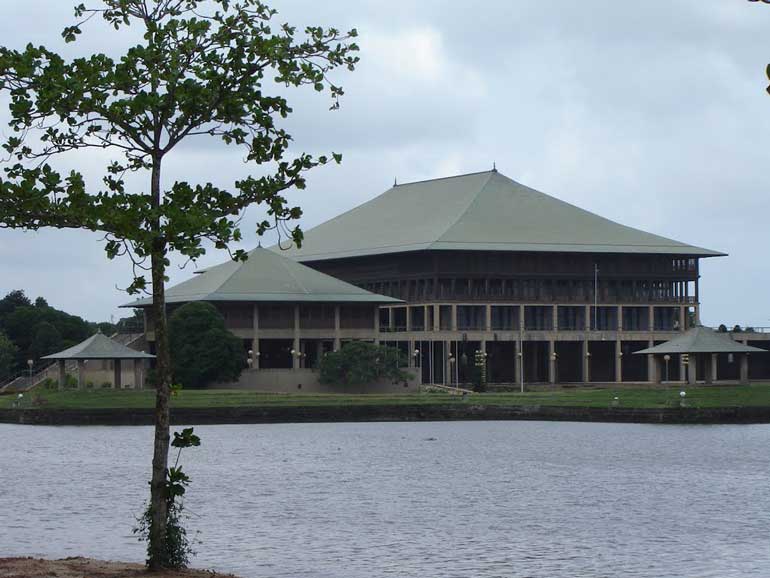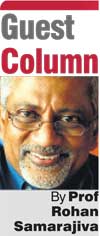Saturday Feb 14, 2026
Saturday Feb 14, 2026
Thursday, 15 October 2015 00:00 - - {{hitsCtrl.values.hits}}

If the 19th Amendment is anything to go by, we have a crisis in drafting skills. The 19th Amendment is a terrible text. If the people who drafted it are also responsible for the new Constitution, we will all be in trouble
I lived through the making of several Constitutions, starting with the sonorous speeches Dr Colvin R. de Silva used to make on radio as he was working on the 1972 Constitution. Then, I had a front-row seat as a part-time interpreter in Parliament while they were making the 1978 Constitution. In Vancouver as a graduate student, I observed Prime Minister Trudeau patriate the Canadian Constitution and introduce the Charter of Rights and Freedoms. It appears from the political gossip that I may be in for another.
Beware Constitutional revolutions
Dr. Colvin R. de Silva got the revolution he wanted, even if only a Constitutional one. Drawing authority from the two-thirds majority the government won in 1970, the MPs met at the Nava Rangahala for their deliberations, signifying a break from the Soulbury Constitution. Given the need for approval at a Referendum and concurrence by the governments in the Provinces, it appears that thought is being given to a repeat of 1972.
 But caution is in order. The 1972 Constitution was approved by riding roughshod over the Tamil leadership. It destroyed their legitimacy and created the conditions for the rise of Prabhakaran.
But caution is in order. The 1972 Constitution was approved by riding roughshod over the Tamil leadership. It destroyed their legitimacy and created the conditions for the rise of Prabhakaran.
In 1970, the government had an electoral mandate for a new Constitution, even if it was not the two-thirds mandate they made a big deal about. In 2015, no party or coalition gained even a simple majority. Given the intense polarisation affecting our polity, it would not be a good idea to sidestep the referendum and the legitimacy it would confer.
Revolutions eat their young, as Danton and Leon Trotsky understood, a little too late. The 1972 Constitutional Revolution ate our young too. Incrementalism is messy, but it’s safer for the young as well as the old.
Clear thinking
The way things are done in the United States seeps into the consciousness of people who’ve never been there and don’t think too deeply about Constitutions. This was the big concern in Canada in 1981-82. We are a Parliamentary system they said. We don’t want the US Presidential system being smuggled into our country, many in that debate said. In a Parliamentary system the election is a choice between political parties, not between Prime Ministerial candidates. Cabinet Ministers are not expected to be subject experts, but are how the government machinery is held accountable.
The chatter in the past weeks around the formation of the Cabinet showed how deeply American political thinking has seeped into our political culture. Many people thought an economist should have been appointed to the Finance portfolio; and that an electrical engineer should have been made Minister of Power and Energy. They don’t like political parties appointing unelected persons through the National List, but they want technocrats holding Ministerial portfolios.
I’ve always wondered why President Jayawardene did not live up to his nickname and adopt the American system wholesale, especially the clear separation of the executive and the legislative branches. It’s cumbersome but it works, mostly.
Instead, he went for a system that was neither here nor there. Minsters had to be elected (the National List was not part of the original design). He pandered to the demands of legislators for executive authority by creating non-Cabinet ministerial positions and by introducing the abomination known as the decentralised budget.
Myanmar has created a clear distinction between the legislature and the executive and it seems to work. We could try it too, given how deeply American values seem to have seeped into our minds.
The Prime Minister has spoken of the Donoughmore system of executive committees. If there is no realistic prospect of weaning the MPs from executive power (after all, it is their votes are needed for Constitutional changes), why not go the whole hog and appoint everyone to executive committees? The number of committees can be defined rationally and those who are elected to chair the committees can form the Cabinet.
Government officials will be responsible for conducting the business of state as should be the case in the Westminster system. Instead of an all-powerful Minister breathing down their necks, there would now be a committee who will hopefully control each other’s excesses and ensure transparency.
Or we could go pure Westminster, with a ceremonial President and a Prime Minister fully accountable to his or her party and to Parliament. After seeing the antics in Australia, I am skeptical, but it should be considered.
Professional drafting
If the 19th Amendment is anything to go by, we have a crisis in drafting skills. The 19th Amendment is a terrible text. If the people who drafted it are also responsible for the new Constitution, we will all be in trouble.
One example: What was needed with regard to the Right to Information was a simple statement that “every citizen shall have the right of access to any information in the custody of a public authority or a private body as provided for by law.” The all the details could have been provided for in the law. Instead, we have been given a cat’s cradle of legal language that will take years to clarify through the courts and will make the crafting of the Right to Information Law a challenge.
It’s as though the people drafting laws these days are those who slept through the course on interpretation of statutes. We should make sure we get some who were paying attention.